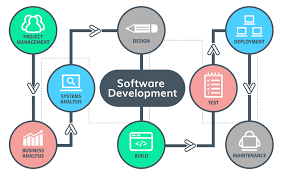Unlocking Innovation: The Power of a Software Development Center
The Importance of a Software Development Center
A software development center plays a crucial role in the creation, maintenance, and enhancement of software applications. It serves as a hub where talented developers, designers, testers, and project managers collaborate to deliver high-quality software solutions.
Key Functions of a Software Development Center
Software Development: The primary function of a software development center is to design and develop custom software applications tailored to meet specific business requirements.
Quality Assurance: Quality assurance teams within the center ensure that the software meets industry standards and functions flawlessly before deployment.
Project Management: Project managers oversee the development process, ensuring timely delivery and effective communication among team members.
Benefits of Establishing a Software Development Center
Efficiency: Having all development resources in one centralized location promotes efficient collaboration and streamlined processes.
Innovation: A dedicated software development center fosters innovation through brainstorming sessions, knowledge sharing, and continuous learning.
Cost-Effectiveness: By leveraging in-house talent and resources, organizations can reduce outsourcing costs and maintain control over project timelines.
The Future of Software Development Centers
In an increasingly digital world, the demand for custom software solutions continues to rise. Establishing a software development center enables organizations to stay competitive by delivering cutting-edge applications that meet evolving user needs.
In conclusion, a well-equipped software development center is essential for organizations looking to drive innovation, enhance operational efficiency, and deliver superior software products to their customers.
Understanding Software Development Centers: Key Functions, Benefits, and Best Practices
- What is a software development center?
- What are the key functions of a software development center?
- How does a software development center contribute to the software development process?
- What are the benefits of establishing a software development center?
- How can a software development center improve efficiency in project delivery?
- What roles and responsibilities are typically found in a software development center?
- How can organizations ensure effective collaboration within their software development center?
- What technologies and tools are commonly used in a software development center?
What is a software development center?
A software development center is a specialized facility where teams of skilled professionals collaborate to design, develop, test, and deploy software applications. It serves as a centralized hub for all stages of the software development lifecycle, from conceptualization to implementation. In a software development center, experts in various domains such as programming, design, quality assurance, and project management work together to create tailored solutions that meet specific business needs. This dedicated environment fosters innovation, efficiency, and collaboration among team members to deliver high-quality software products effectively.
What are the key functions of a software development center?
A software development center serves as a vital hub for various functions essential in the software development process. The key functions of a software development center include software development, where talented teams design and create custom software solutions to meet specific business needs. Quality assurance is another critical function, ensuring that the developed software meets high standards and functions seamlessly. Project management within the center coordinates tasks, schedules, and resources to ensure timely delivery of projects and effective communication among team members. These functions collectively contribute to the successful creation, maintenance, and enhancement of software applications within a dedicated software development center.
How does a software development center contribute to the software development process?
A software development center plays a pivotal role in the software development process by providing a dedicated environment where skilled professionals collaborate to create, enhance, and maintain software applications. It serves as a hub for innovation, fostering teamwork and knowledge sharing among developers, designers, testers, and project managers. By centralizing resources and expertise, a software development center ensures efficient communication, streamlined processes, and effective project management. This collaborative setting enables the team to deliver high-quality software solutions that meet specific business requirements while promoting creativity and continuous learning within the organization.
What are the benefits of establishing a software development center?
Establishing a software development center offers numerous benefits to organizations. One key advantage is the ability to centralize development resources, fostering efficient collaboration and streamlined processes. Additionally, having a dedicated center promotes innovation through knowledge sharing and continuous learning among team members. Cost-effectiveness is another significant benefit, as organizations can leverage in-house talent and resources to reduce outsourcing costs and maintain control over project timelines. Overall, a software development center enables businesses to drive innovation, enhance operational efficiency, and deliver high-quality software solutions that meet the evolving needs of their customers.
How can a software development center improve efficiency in project delivery?
A software development center can significantly enhance efficiency in project delivery through various means. By centralizing all development resources and expertise in one location, communication and collaboration among team members are streamlined, leading to quicker decision-making and problem-solving. Additionally, the presence of dedicated project managers ensures that timelines are adhered to, resources are allocated effectively, and potential roadblocks are addressed promptly. Furthermore, the center’s focus on continuous improvement and innovation fosters a culture of efficiency, where best practices are shared, and lessons learned from previous projects are applied to optimize future deliveries. Overall, a well-established software development center can create a conducive environment for efficient project execution and timely delivery of high-quality software solutions.
What roles and responsibilities are typically found in a software development center?
In a software development center, various roles and responsibilities are essential for the successful creation and delivery of software solutions. Common roles include software developers who write code and build applications, quality assurance testers who ensure the software meets high standards, project managers who oversee timelines and resources, designers who create user-friendly interfaces, and system administrators who maintain the infrastructure. Additionally, business analysts gather requirements from stakeholders, while technical support teams provide assistance to users post-deployment. Each role plays a crucial part in the software development lifecycle within a center, contributing to the overall success of projects and meeting client expectations.
How can organizations ensure effective collaboration within their software development center?
Effective collaboration within a software development center is crucial for the success of any organization’s projects. To ensure seamless collaboration, organizations can implement several strategies. Firstly, establishing clear communication channels and project management tools can help team members stay connected and informed about project progress. Encouraging a culture of transparency and open dialogue fosters trust among team members and promotes idea sharing. Additionally, organizing regular team meetings, brainstorming sessions, and code reviews can enhance collaboration by allowing team members to provide feedback, share insights, and address any challenges collectively. By promoting a collaborative environment built on communication, transparency, and teamwork, organizations can maximize the potential of their software development center and achieve successful project outcomes.
What technologies and tools are commonly used in a software development center?
In a software development center, a variety of technologies and tools are commonly utilized to facilitate the development process and ensure the delivery of high-quality software solutions. Some of the most frequently used technologies include programming languages such as Java, Python, C#, and JavaScript, as well as frameworks like React, Angular, and Node.js. Version control systems like Git are essential for managing code changes efficiently, while integrated development environments (IDEs) such as Visual Studio Code and IntelliJ IDEA provide developers with powerful tools for coding and debugging. Additionally, project management tools like Jira and Trello help teams organize tasks and track progress effectively. By leveraging these technologies and tools, software development centers can streamline their workflows, collaborate more efficiently, and deliver innovative solutions to meet client needs.




